You are here
New Releases
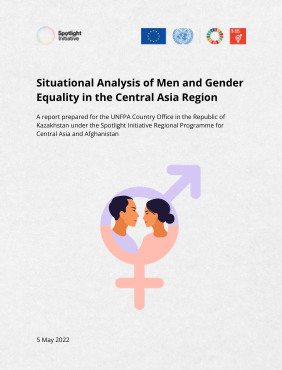
Situational Analysis of Men and Gender Equality in the Central Asia Region
Gender-equitable men support gender-equitable futures. Engaging men and boys in promoting gender equality and eliminating all forms of violence against women and girls (VAWG) is a critical priority of the Spotlight Initiative.1 The Spotlight Initiative is a global initiative of the United Nations which has received generous support from the European Union. It aims to eliminate all forms of violence against women and girls. One of the six key pillars of the Spotlight Initiative is ‘Prevention,’ which involves engaging men and boys in the ‘promotion of gender-equitable norms, attitudes, and behaviors.’ The inclusion of addressing harmful masculine norms is the result of decades of research on VAWG and sexual and reproductive health and rights, as well as advocacy from women’s and other gender equality movements. Such research has found that harmful masculine norms of what it means to be a man contributes to the normalization and perpetuation of men’s violence against women and girls
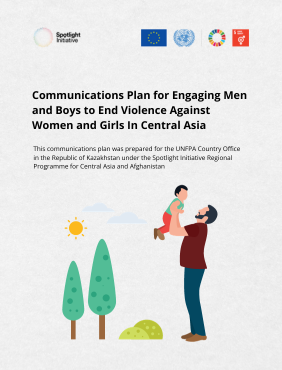
Communications Plan for Engaging Men and Boys to End Violence Against Women and Girls In Central Asia
The Communications Plan for Engaging Men and Boys to End VAWG In Central Asia provides recommendations on how to develop effective communications strategies and activities engaging men and boys in preventing VAWG. The Communications Plan is based on promising advocacy and campaign practices for engaging men and boys in gender equality, as well as findings from the UNFPA Situational Analysis of Men and Gender Equality in Central Asia. This Communications Plan is for civil society and public organizations, development actors, activists, members of state institutions who address gender equality and gender-based violence as part of their mandate (such as Ministries of Social Development, for example), and UN agencies.

Kazakhstan: Advancing Adolescent Heath through Policy and Reform
Kazakhstan’s 2025 Health Development Policy prioritizes strengthening youth-friendly health centres (YFHCs). A package of new regulations was developed and centred on increasing coverage and access to adolescent sexual and reproductive health. With support from the United Nations Population Fund, the Ministry of Health also created a legal framework, developed clinical and operational standards, institutionalized YHFCs while strengthening their capacity. Interventions also seek to generate demand for the services, and develop communication tools. Adolescents have access to SRH at the primary health-care level, including outpatient access to youth-friendly health services.

SEXUAL AND REPRODUCTIVE HEALTH CARE AND RESPONSE TO GENDER-BASED VIOLENCE IN HUMANITARIAN EMERGENCIES
Global experience shows that in any emergency and humanitarian setting, large groups of people would be displaced, fleeing their homes in search for safety and shelter. Under these conditions, women and girls become the most vulnerable and are at the highest risk, when it comes to their lives and sexual and reproductive health.Neglecting sexual and reproductive health (SRH) needs in a humanitarian crisis has serious consequences in terms of increased deaths from unsafe births, sexual violence, unwanted pregnancies and risky abortions, and the spread of sexually transmitted infections, including HIV.
Recommended and used by the global community since 1996, the Minimal Initial Service Package for Sexual and Reproductive Health (MISP) is a coordinated set of priority life-saving SRH interventions and services to be implemented from the outset (if possible, within 48 hours) of each humanitarian emergency and used ideally within 3-6 months. After this period, ideally, MISP should be integrated into the primary health care sector or replaced by a rebuilt health care system.
The results of the MISP readiness assessment in Kazakhstan demonstrate a certain degree of maturity of the regulatory environment and the civil protection management system, which has significant potential for improving the specific mechanisms for MISP deployment readiness.
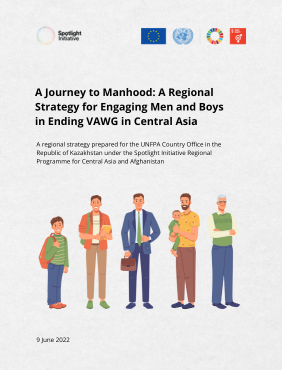
A Journey to Manhood: A Regional Strategy for Engaging Men and Boys in Ending VAWG in Central Asia
A Journey to Manhood: A Regional Strategy for Engaging Men and Boys in Ending VAWG in Central Asia provides guidance on the key entry points to engaging men and boys throughout the life course. The regional strategy is informed by the UNFPA Situational Analysis of Men and Gender Equality in Central Asia developed for five Central Asian countries – Kazakhstan, Kyrgyzstan, Tajikistan, Turkmenistan, and Uzbekistan – who are beneficiaries of the Spotlight Initiative Regional Program for Central Asia and Afghanistan. The Situational Analysis synthesized and summarized the evidence on how governments currently address men’s engagement in laws, policies, and national action plans; analyzed prevalent gender-related attitudes, perceptions, and practices of men and women in the region; and summarized the best and most promising practices on engaging men and boys.
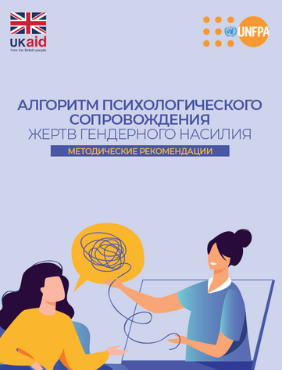
A series of manuals on response to gender-based violence
A series of manuals on response to gender-based violence

PROVIDING MEDICAL CARE TO TEENAGERS IN YOUTH HEALTH CENTERS
PROVIDING MEDICAL CARE TO TEENAGERS IN YOUTH HEALTH CENTERS
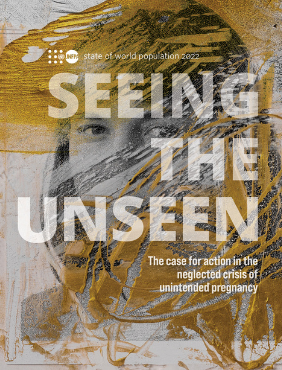
Seeing the Unseen - State of World Population 2022
The case for action in the neglected crisis of unintended pregnancy
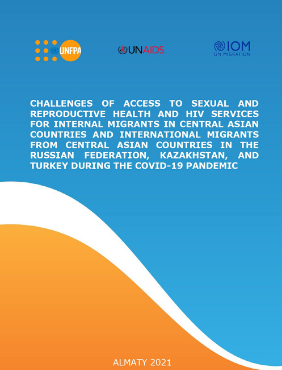
CHALLENGES OF ACCESS TO SEXUAL AND REPRODUCTIVE HEALTH AND HIV SERVICES FOR INTERNAL MIGRANTS IN CENTRAL ASIAN COUNTRIES AND INTERNATIONAL MIGRANTS FROM CENTRAL ASIAN COUNTRIES IN THE RUSSIAN FEDERATION, KAZAKHSTAN, AND TURKEY DURING THE COVID-19 PANDEMIC
This paper presents and discusses the findings of a desk review on the state of migration and sexual and reproductive health (SRH) of the populations in migrant-sending countries, including Kyrgyzstan, Tajikistan, Turkmenistan, and Uzbekistan. In addition, it considers the qualitative data on the access of Central Asian internal and external migrants to antenatal and perinatal care, family planning services, and contraception, including condoms, safe abortion (legal in all countries under consideration), treatment of sexually transmitted infections,
and HIV infection prevention, diagnosis and treatment based on in-depth interviews with experts mobilized both in origin and destination countries. Case studies of relevant migrants' life situations are depicted.
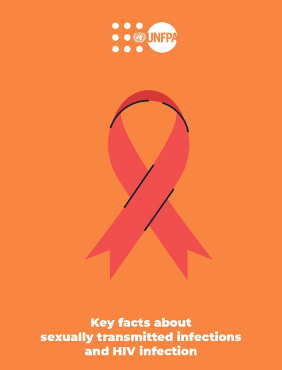
Key facts about sexually transmitted infections and HIV infection
Key facts about sexually transmitted infections and HIV infection